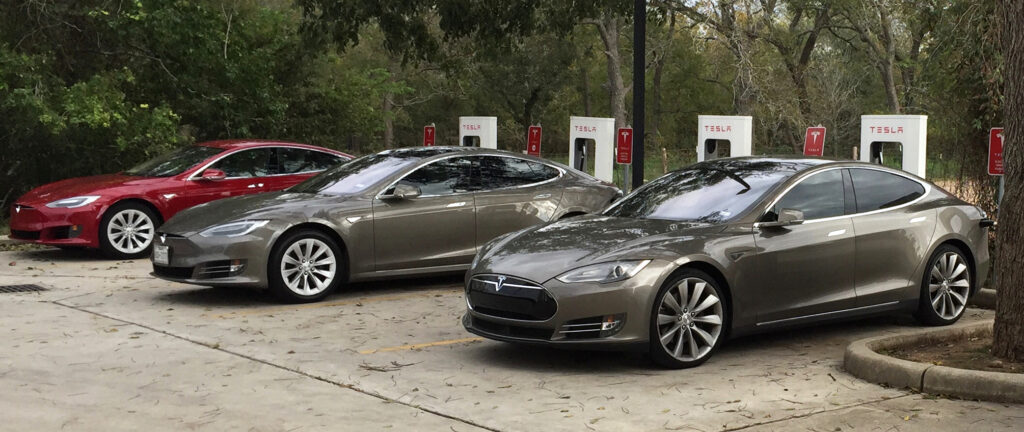Despite massive subsidies and upcoming state bans on the sales of new gasoline-powered cars, the electric vehicle industry is on the verge of collapse, demonstrating yet again that government is incapable of picking winners and losers, consumer demand always trumps government edicts, and Americans simply do not want to purchase and drive electric vehicles at this point in time.
The primary reason Americans are wary of buying or leasing an electric vehicle (EV) is they cost too much. According to Kelly Blue Book, the average price of an EV is $53,469 whereas the average price of a gasoline-powered car is $48,344.
When comparing models that are offered in both electric and gasoline-powered, the price difference becomes even more stark. For example, the Ford F-150 gasoline-powered pickup truck sells for $40,960 while the Ford F-150 Lighting electric pickup truck is priced at $54,769. Likewise, the Hyundai Kona gasoline-powered sedan sells for $22,595 compared to the Hyundai Kona electric version, which sells for $35,295.
In general, gasoline-powered cars are still much less expensive than their EV counterparts, even after the $7,5000 government tax credit is applied.
The second-most cited reason that Americans remain skeptical about EVs is “range anxiety,” fear that the battery will run out before one reaches their destination. Although strides have been made in recent years regarding the range of EVs, they still pale in comparison to gasoline-powered cars.
On a similar note, the third-most cited reason Americans remain reluctant to buy an EV is their concern over the availability (or lack thereof) to have ready access to charging stations. Not only are people worried that they could get stuck in a place that doesn’t have an EV charging station, they are also apprehensive about the time it takes to charge their vehicle. According to a recent poll, 80 percent of Americans said they would not buy an electric vehicle due to lack of ready access to a charging station.
As of now, given the present technology in place, it can take anywhere from 35 minutes to a full day to charge an EV. This is incredibly inconvenient and makes long-distance travel in an EV unpractical at the least.
Electric vehicles are also far less reliable than traditional combustion-engine vehicles. As Consumer Reports notes, electric vehicle owners “experienced 79% more problems with them compared to gas-powered cars. EV trouble spots include those with charging, electric motors, and batteries.” As most experienced drivers can attest to, a car breaking down is a nightmare scenario. You feel helpless. This feeling of helplessness is much more likely to occur when driving an EV than a standard gasoline-powered vehicle.
Moreover, electric vehicles “tend to showcase innovations, such as the latest controls, infotainment systems, and even electric-powered glove boxes and door handles. All these new features can often mean new problems,” per Consumer Reports.
Yet another reason Americans are hesitant to buy an EV is that the lithium-ion batteries can overheat and catch fire. Although EV fires are still somewhat rare, they are increasing in frequency. Over the past four years, New York City and San Francisco have reportedly responded to at least 669 EV fires. Unfortunately, EV fires are far more dangerous than when a gasoline-powered vehicle catches on fire. They also emit toxic fumes, produce substantial property damage, and present a hazard to first responders.
In fact, EV fires are potentially so dangerous that towns and cities are having to invest in special equipment just to fight EV fires. In Libertyville, Illinois, the fire department recently announced it spent “$30,000 for equipment specifically designed to quickly extinguish fires involving lithium-ion high voltage batteries in electric vehicles.”
Eventually, as technology advances, it is more than likely that EVs will become affordable, reliable, and safe. Perhaps in the not-so-distant future they will become a viable alternative to gasoline-powered cars. However, that is not the case at the present moment.
It would be a much better approach if the federal government, and state governments as well, let this “transition” happen organically. When gasoline-powered vehicles were in the early stages of development, the government did not intervene and nudge people to switch from horses to automobiles. The same dynamic is true for any emerging technology. When smart phones and flat screen TVs were in their infancy, the government stayed out of the way, too. We know that consumers make decisions based upon a vast array of factors and sometimes it takes years for a new a technology to catch on. This is especially true for personal transportation, as it is a very significant aspect of most Americans’ lives. American car culture is deeply rooted and it cannot simply change on a dime because central planners have deemed EVs as the greatest thing since sliced bread.
Photo by Ed Uthman. Creative Commons Attribution-Share Alike 4.0 International





